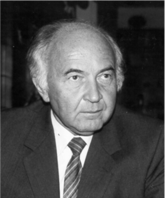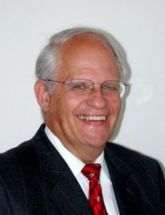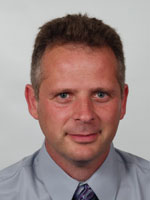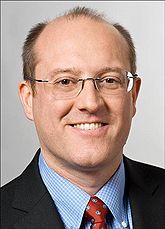Contents
Prof. Dr.-Ing. Dr.-Ing. E.h. Hans Marko (1962-1993)
Hans Marko, born on February 24, 1925 in Kronstadt/Siebenbürgen, studied communications engineering at the TH Stuttgart and received his doctorate in 1953 under Ernst Feldtkeller. He then worked at Standard Elektrik Lorenz AG, where he developed one of the first pulse code modulation systems in Germany. At this time he was already lecturing at the universities of Stuttgart and Karlsruhe. In 1961, he wrote his post-doctoral thesis on the utilization of telegraph channels for information transmission.
In 1962, at the age of only 37, Hans Marko succeeded Hans Piloty as head of the "Lehrstuhl für Nachrichtentechnik" (LNT) at the "Technische Hochschule München" (today: Technical University of Munich, TUM) and worked successfully in teaching and research for 31 years until his retirement. He supervised nine habilitations and 75 doctorates.
The scientific fields he and his institute worked on included
- the application of systems theory in technical, biological and cybernetic systems and its multidimensional extension for image processing and pattern recognition,
- the further development of Shannon's information theory to a bidirectional communication theory,
- theoretical investigations and practical realizations of high-rate digital transmission systems over cable and optical fiber.
Hans Marko is the author of several books and more than one hundred publications as well as numerous patents. He has received many high-ranking honors:
- He is a laureate of the "Nachrichtentechnische Gesellschaft" (NTG) and a "Fellow of the Institute of Electrical and Electronics Engineering" (IEEE).
- In 1983, he was the first to be awarded the "Karl Küpfmüller Prize" of the Information Technology Society in the VDE.
- In 1985 he received an honorary doctorate from the TH Darmstadt and in 1994 the Cross of Merit of the Federal Republic of Germany.
- He is a founding member of the "Academia Scientiarium et Artium Europaea" in Salzburg.
After his retirement in 1993, Hans Marko has always remained connected to his former institute, both to his direct successor Joachim Hagenauer as well as his successors Ralf Kötter and Gerhard Kramer. Of particular note in this context was his participation in a workshop in May 2012, at which, at the age of 87, he discussed his findings on "bidirectional communication" obtained 40 years ago with the pioneer James Massey and other leading researchers in this field.
Professor Hans Marko passed away on Sept. 12, 2017, in Gräfelfing, Germany, at the age of 93.
Hans Marko's contribution to the LNTwww results from the fact that our authors Klaus Eichin, Norbert Hanik and Günter Söder did their PhD with him. Many of the statements in the books "Signal Representation", "Linear Time-Invariant Systems", "Modulation Methods" and "Digital Signal Transmission" are thus indirectly due to Professor Marko.
Prof. Dr.-Ing. Dr.-Ing. E.h. Joachim Hagenauer (1993-2006)
$\text{Hagenauer's Biography from the LNT website}$
The beginning of the LNTwww falls during Hagenauer's time as chair of the LNT. All the teaching areas considered here were also the content of his courses and those of his PhD students. Many of them were actively involved as co–authors or experts in the development of LNTwww.
We thank Professor Joachim Hagenauer for his constant support of our e-learning project.
Prof. Dr. Ralf Kötter (2007-2009)
Ralf Kötter, born on October 10, 1963 in Königstein/Taunus and deceased on February 2, 2009 in Munich, was a German professor in the field of „electrical engineering and information technology” whose numerous works in the field of network coding were of central importance for the further development of mobile communications despite his early death.
Ralf Kötter studied electrical and communications engineering at Darmstadt Technical University. After graduating in 1990, he subsequently worked at the University of Linköping in the Department of Electrical Engineering until 1996. There he received the degree of Ph.D. (Teknisk Doktor) in Electrical Engineering in 1996. In 1996/97, he was a visiting scientist at the IBM Almaden Research Laboratory in San José, California, and subsequently a professor at the Coordinated Science Laboratory and Department of Engineering at the University of Illinois at Urbana-Champaign. In October 2006, he accepted an appointment to the Chair of Communications Engineering in the Department of Electrical Engineering and Information Technology at the Technical University of Munich, succeeding Joachim Hagenauer.
Ralf Kötter worked in the field of algebraic coding theory and was one of the first scientists to use graph theory to develop error control codes. For his work on decoding Reed-Solomon codes, he was awarded the Best Paper Award of the IEEE Information Theory Society in 2004. In 2008, he received the Best Paper Award of the Signal Processing Society for his work on turbo equalization. In addition, he was awarded the 2008 Vodafone Foundation Innovation Award for Research for his „seminal work” on information and coding theory.
Ralf Kötter died at the age of only 45, leaving behind his wife Nuala (who also died of cancer just under 5 years after him) and his then 4-year-old son Finn.
The Department for Electrical and Computer Engineering at his former university in Illinois established the Ralf Koetter Memorial Fund in Electrical and Computer Engineering after his death to support students in the department. Ralf's parents Ruth and Hubert Koetter endowed the „Prof. Dr. Ralf Koetter Memorial Award” in 2010, which will be awarded annually until 2023.
Important Awards and Honors for Ralf Kötter:
- IBM Invention Achievement Award (1997).
- NSF CAREER Award (2000)
- IBM Partnership Award (2001)
- Best Paper Award of the IEEE Information Theory Society (2004)
- University of Illinois College of Engineering XEROX Award for Faculty Research (2006)
- Best Paper Award of the Signal Processing Society (2008)
- Innovation Award of the Vodafone Foundation for Research (2008)
Prof. Kötter has been very supportive of the further development of the learning tutorial "LNTwww"'. Especially in the books Information Theory and Channel Coding one can clearly recognize his "scientific handwriting".
$\text{Kötter's Biography from the LNT website}$
Prof. Dr. sc. techn. Gerhard Kramer (seit 2010)
Gerhard Kramer, geboren am 08. April 1970 in Winnipeg, Kanada, ist Alexander–von–Humboldt–Professor und seit 2010 Ordinarius des Lehrstuhls für Nachrichtentechnik (LNT) an der Technischen Universität München (TUM). Er erhielt 1991 den B.Sc. und 1992 den M.Sc. in Elektrotechnik von der University of Manitoba, Winnipeg, Kanada. 1998 wurde ihm von der Eidgenössischen Technischen Hochschule (ETH) Zürich der Dr. sc. techn. (Doktor der technischen Wissenschaften) verliehen.
Von 1998 bis 2000 arbeitete Gerhard Kramer bei Endora Tech AG, Basel, als Kommunikations–Ingenieur. Von 2000 bis 2008 war er als Member of Technical Staff beim Math Center, Bell Laboratories, Alcatel–Lucent in Murray Hill/New Jersey tätig. 2009 wechselte er als Professor an die University of Southern California (USC) in Los Angeles/Kalifornien.
Seit 2010 ist Gerhard Kramer an der Technischen Universität München. Seine Forschungsschwerpunkte liegen auf der Informationstheorie und der Kommunikationstheorie mit Anwendungen sowohl bei drahtlosen als auch bei leitungsgebundenen Netzen über Kupfer bzw. Glasfaser.
Hier eine Auswahl der Preise und Ehrungen für Prof. Gerhard Kramer:
- ETH–Medaille (1999)
- Bell Labs President’s Gold Award als Mitglied des BLAST (Bell Labs Layered Space-Time)-Teams (2003)
- IEEE Communications Society Stephen O. Rice Prize (2005)
- Mitgründer der Schools of Information Theory auf mehreren Kontinenten (2008-2010)
- IEEE Fellow für Beiträge zu Codierter Modulation, Iterativer Decodierung und cooperativer Kommunikation (2010)
- Alexander von Humboldt Professur, verliehen vom Bundesministerium für Wissenschaft und Forschung (2010)
- Vodafone Innovationspreis für grundlegende Forschung zu kooperativen Kommunikationsnetzen (2011)
- Präsident der IEEE Information Theory Society (2013)
- Mitglied der Bayerischen Akademie der Wissenschaften (2015)
- Dozentenpreis für exzellente Lehre, Fachschaft der Fakultät EI an der TUM ( 2015)
- Thomson Reuters Highly Cited Researcher for publishing high-impact work in Computer Science during 2002-2014 (2014-2016)
- Distinguished Lecturer der IEEE Information Theory Society (2015-2016)
In seiner Zeit als Lehrstuhlinhaber des LNT fällt die (vorläufige) Fertigstellung des Lerntutorials LNTwww und dessen Konvertierung in das hier vorliegende Wiki-Format. Wir danken Prof. Kramer und einigen seiner Mitarbeiter für die große Unterstützung unseres e-Learning-Projekts.
Alle in LNTwww berücksichtigten Lehrgebiete werden auch in den Lehrveranstaltungen von Prof. Kramer behandelt. Aber nicht alle seiner Vorlesungsinhalte sind in LNTwww mit der gleichen Tiefe und mathematischen Exaktheit dargestellt.
Biografie auf der LNT–Homepage (in English)



